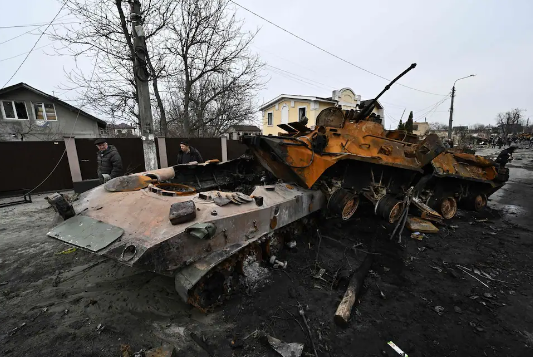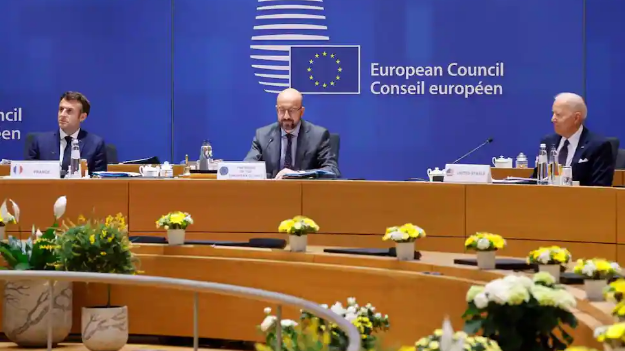After several sets of measures in response to Moscow’s invasion of Ukraine, the United States must adopt during the day, in coordination with the European Union and the G7, new sanctions against Russia aimed in particular at prohibiting ” any new investment” in this country, according to a source familiar with the matter.
These punitive measures will further include “enhanced sanctions against financial institutions and public companies in Russia, and sanctions against Russian government officials and their relatives”.The situation in Ukraine will also be on the menu of the meeting on Wednesday and Thursday in Brussels of the Foreign Ministers of the NATO countries, who must notably discuss with their Ukrainian counterpart Dmytro Kouleba the needs of the Ukrainian forces.

“I don’t want to give details, but the supply of anti-tank weapons and anti-aircraft defense systems is being considered,” Alliance Secretary-General Jens Stoltenberg said.
NATO only intervenes militarily to defend its members when one of them is attacked or under UN mandate. Ukraine is not a member, and it is, in particular, a possible membership that Russian President Vladimir Putin has put forward to justify the invasion of this former Soviet republic. But nothing prevents the thirty countries of the Alliance from providing assistance.
These new steps against Moscow come the day after another impassioned appeal by Ukrainian President Volodymyr Zelensky, who urged at a meeting of the UN Security Council to act “immediately” against Russia in view of its “crimes of war” committed according to him in Ukraine.
In particular, the Ukrainian president had dramatic images projected before the diplomats showing numerous corpses, according to Kyiv, of civilian victims of abuses, filmed in localities recently evacuated by the Russian army, which is regrouping towards the eastern areas. from the country.
‘Evermore awful’
Pope Francis on Wednesday lambasted “ever more horrible cruelty (including) against civilians, women, and children”.
The Ukrainian authorities say for their part that Boutcha “is not the worst”, fearing the discovery of other massacres. Moscow rejects any accusation of abuses, accusing the Ukrainian authorities of preparing “stagings” of civilians killed in several cities to condemn the Kremlin. But the discovery of victims, particularly in the locality of Boutcha, near Kyiv, created a shock wave and led the European Union and Washington to intensify their economic and diplomatic pressure on Moscow, already targeted by a thick mille-feuille of sanctions decided around the world.

On the ground, Moscow’s new strategy of concentrating efforts on Donbas, a region partly held since 2014 by pro-Russian separatists, continues to be put in place. “The Russian troops will rearm, receive reinforcements in numbers, because they have suffered a lot of losses, and resupply to launch a new, very concentrated offensive in the Donbas region”, warned Mr. Stoltenberg on Tuesday. , evoking “a crucial phase of the war”.
The governor of the Lugansk region, Serguiï Gaïdaï, called on the inhabitants to leave the region: “Evacuate as long as it is safe (…) As long as there are buses and trains, take advantage of this possibility. Yesterday the Russians damaged rail communications in the Donetsk region. The repairs lasted several hours, trains were delayed it is still a signal of danger. Get yourself and your loved ones to safety.”
Along a road linking the town of Izium, recently taken by Russian forces, to the twin towns of Sloviansk and Kramatorsk, capital of Donbas controlled by Kyiv, Ukrainian forces are preparing, noted AFP journalists.
«Surprises»
Trenches dug with bulldozers, artillery pieces, and other more or less buried armored vehicles dot the surroundings. The forest, where soft flowerbeds of purple bells herald spring, is riddled with shelters and other camouflaged equipment promising much more sinister showers of fire.
The fortified road is cluttered with anti-tank obstacles. While winter is over, and the soggy black earth limits the progress of tanks in neighboring crops, we must hold the asphalt.
“The Russians are busy, we know they are preparing to attack,” said a senior officer, referring to an increase in Russian helicopter flights over the front.
“We are ready. We have prepared some surprises for them”, comments this robust veteran of the 2014 war, wounded twice, who “almost lost his right leg” and now walks like a guy.
Krasnopillia, with its country houses with enclosures and windows with wooden transoms, is full of soldiers, members of the 95th Airmobile Brigade, an elite unit with the eagle in its emblem. Do they fear the coming Russian hurricane? “You know the story of David and Goliath…”, replies the officer.
Further on, Ukrainian logistics are also targeted, such as this oil depot in Novomoskovsk, near Dnipro, bombed and destroyed by the Russian army overnight from Tuesday to Wednesday, without causing any casualties, according to the authorities. local.
The Russian Ministry of Defense for its part indicated that the Russian forces destroyed with missiles five fuel depots in Novomoskovsk, Radekhov, Kazatine, Prossianaïa, and Mykolaiv. These depots supplied the Ukrainian forces in the regions of Kharkiv and Mykolaiv, as well as in the Donbas.
During the night from Tuesday to Wednesday, Russian airstrikes targeted 24 Ukrainian military sites, including five depots of technical equipment, according to a press release from the ministry.
Tragic Choices
Russian forces are also still seeking to consolidate their positions on the coastal strip along the Sea of Azov in southern Ukraine to connect the Donbas regions to the Crimean Peninsula, annexed by Moscow in 2014.
The fighting is still focused in particular on the large port city of Mariupol, whose mayor described the situation to AFP on Tuesday as having “exceeded the stage of a humanitarian disaster”.
The Russian military said on Tuesday it shot down two Ukrainian helicopters seeking to evacuate leaders of a nationalist battalion defending the besieged port, again calling on the defenders to lay down their arms. Some 120,000 residents are still stuck there, according to the mayor, and the evacuees, after a grueling journey of 200 kilometers, find themselves in reception centers in Zaporizhzhia, inland.

Angela Berg, an energetic 55-year-old woman with short hair, left everything in the hell of Mariupol, including her mother, who was too old to undertake this journey.
“A man armed with a machine gun forced us to lie on the ground in front of our 12-story building, on pieces of broken glass. Then they started shooting at it with tanks, the building caught fire. And the man with the submachine gun was shooting at people who were trying to get out,” she told AFP.
“They didn’t let us collect anything until everything was burned, neither belongings nor documents.” And her voice breaks at the mention of her mother and her invalid sister-in-law whom she had to abandon to save the rest of her family, including her sick 3-month-old granddaughter: “She is the most painful decision I have ever made. I had to choose between my mother and my grandchildren”.







